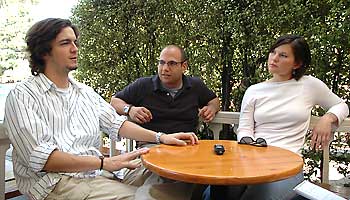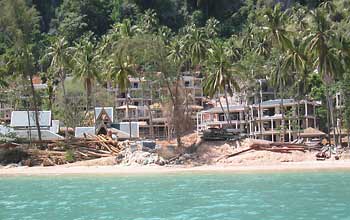UC Berkeley Web Feature
In aftermath of tsunami, UC Berkeley team visits Thailand to open dialogue on impacts of tourism
BERKELEY – On a cloudy morning in late May, barely 48 hours before her plane would leave for Thailand, Rachel Edmonds sat outside a Berkeley café, pondering the nature of silver linings. "It's unfortunate that when a disaster happens, a lot of things are destroyed and people's lives are shaken up," said Edmonds, a second-year grad student, referring to the Dec. 26, 2004 tsunami that ravaged South Asia. "But there is an opportunity for intervention at that point, when you can have more impact than you could when things aren't falling apart."
 As part of a UC Berkeley team in Thailand, city planning students Pedro Peterson (left), Tom Conoscenti, and Rachel Edmonds explored ways to make the tsunami-ravaged country's tourist industry more sustainable. (Photo by Deborah Stalford / UC Berkeley) |
Edmonds was part of a summer "studio project" led by David Dowall, a professor of city and regional planning at Berkeley, and assistant professor Karen Chapple, that aimed at designing a strategic plan for developing sustainable tourism in southern Thailand's Krabi province. Berkeley's 10-student SWOT team — SWOT being planner-speak for an analysis of strengths, weaknesses, opportunities, and threats —worked with students and faculty from Chulalongkorn University and staff from the Thai Public Policy Institute.
"The tsunami revealed a number of strategic weaknesses in the region's economy and environment," wrote Dowall, who also directs the campus's Institute of Urban and Regional Development, in an overview of the project. These include "over-concentrated and undiversified tourism development" and "widespread negative environmental impacts of unplanned tourism development," and "limit the capacity of the region to respond to natural or manmade hazards."
During the next decade or two, Dowall wrote, "visitation is likely to treble. … As Phuket, Krabi, and Phang Nga rebuild, now is the time to develop long-term strategies for guiding future development in the region."
Looking back after a month in Thailand, Edmonds and two of her project mates, Tom Conoscenti and Pedro Peterson, agree that the trip's long-term impacts are likely to prove subtle, though not insignificant.
"For me, the best thing was the cross-cultural dialogue," says Conoscenti, who'd never traveled abroad before. "It wasn't like we were going there to come up with this plan for Thailand and hand it to them. It was more about personal growth and learning." The students estimate they and their colleagues interviewed more than 100 people, ranging from officials in formal settings to random chats with tourists.
And though the group's ultimate goal is to complete a planning document, adds Peterson, the experience had less to do with answers than with questions. "It's more about asking questions that we think aren't being asked, or maybe are being asked by people who don't really have a voice," he says. "So maybe this can empower them, you know, they can say, ‘Look, people from Chulalongkorn University and UC Berkeley are saying this, so maybe you guys can listen to it. Hopefully that will empower some people."
"You guys," in this case, are the elected officials responsible for overseeing the nation's future economic development. "The access to politicians there was amazing," Conoscenti says. "You could go to the local government office and say, ‘I want a meeting with the governor,' and the same day you'd have an interview."
But it wasn't clear how open many politicians really are to the concept of sustainable development. The former mayor of the city of Krabi, for example — and the brother of the current mayor — took a "typical, pro-development" view. "It just seemed insane to think about that," Conoscenti says, "but that's what he wanted."
Similar attitudes were evident elsewhere in Thailand, including the heart of the country's tourist industry, Phuket, where the study group spent one night. "Phuket wasn't really part of our research area, but they wanted us to see what it was like. Because a lot of people in Krabi, where we were studying, saw Phuket as what not to do, basically," says Peterson.
 Off the mainland of Krabi province, a large, luxurious resort takes shape near Ao Nang beach, one sign of business as usual. (Photo by Rachel Edmonds) |
Krabi offers greater opportunity for innovation, Edmonds explains, than an area like Phuket, which features an international, corporate brand of tourism, and is rapidly rebuilding its big hotels. ("It looks like nothing ever happened," Peterson says.) Krabi's main tourism centers, Lanta and Phi Phi Island — which was devastated by the tsunami, and Peterson describes as "like a ghost town" — are comparatively small and intimate, and thus more open to new ideas.
Even so, no one is banking on too much economic diversity there, either. "I think we had this idea that there was going to be all sorts of economic development — like we're going to have this agriculture strategy, and bring in all these other sectors," says Conoscenti. "And we go to Phi Phi Island and the only thing that's happening there is tourism. I mean it's gorgeous, with awesome beaches. You can't imagine anything else being there."
"One thing that I thought was kind of encouraging," says Peterson, "was that a lot of the people on Phi Phi were tourists that had come there from all over the world just to help them rebuild. They were just spending their vacations helping to rebuild the island. And the people that lived on the island were putting them up in their homes, giving them meals and water and everything. I thought that was a nice thing to see."
The document the group eventually produces — envisioning various scenarios in which different tourism strategies play out in changing global environments — is, in its way, another modest, yet meaningful, gesture of help.
"If we did anything," reflects Conoscenti, "we put certain issues on the table. … What might the population look like in 2025, how much power and land might be consumed under different scenarios, meat-and-potato infrastructure kind of things — that's something I don't think they'd thought that much about."
"The mayor's gonna do what he's gonna do," observes Peterson, referring to the brother of Krabi's pro-development ex-mayor. "What we're hoping is that maybe some fishing villages or some community groups can take [the planning document] and say, well, we can still have tourism, but maybe this is a better way to do it. At least that's what I'm hoping."
His traveling companions share that hope. "Planners," says Edmonds, "specialize in the profession of being useful."

